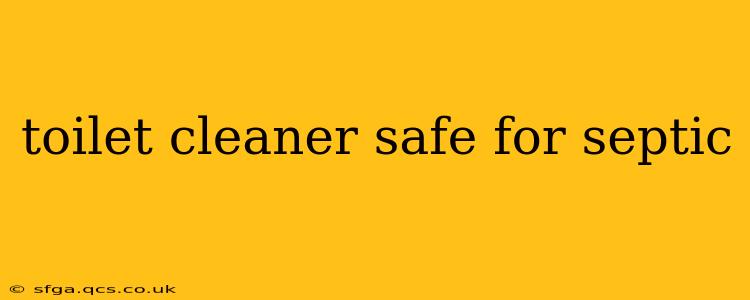Maintaining a clean and functional toilet is essential for every household. However, choosing the right toilet bowl cleaner is crucial, especially if you have a septic system. Using harsh chemicals can disrupt the delicate bacterial balance in your septic tank, leading to costly repairs and environmental problems. This guide explores the best toilet bowl cleaners safe for septic systems and provides essential information to keep your plumbing and the environment healthy.
What Makes a Toilet Cleaner Septic-Safe?
The key to finding a septic-safe toilet cleaner lies in understanding its ingredients. Avoid products containing harsh chemicals like:
- Chlorine bleach: Bleach kills the beneficial bacteria in your septic tank that break down waste. This can lead to sludge buildup and system failure.
- Strong acids: Similar to bleach, strong acids disrupt the bacterial ecosystem, causing problems down the line.
- Formaldehyde: This is a potent disinfectant, and its presence in toilet cleaners warrants extra caution due to its effect on septic systems.
- Phenols: These compounds can also harm the beneficial bacteria in your septic tank.
Septic-safe cleaners typically rely on gentler, enzyme-based formulas. These enzymes work to break down organic waste, complementing the natural processes in your septic tank. Look for labels clearly stating "septic safe" or "safe for septic systems."
How Do Enzymes Work in Septic-Safe Toilet Cleaners?
Enzyme-based cleaners contain beneficial bacteria and enzymes that naturally break down waste and stains. They work in a similar way to the bacteria already present in your septic tank, but at a concentrated level, leading to more efficient cleaning. These enzymes target organic matter, effectively removing stains and odors without harming the septic system's delicate bacterial balance.
Are all "natural" toilet cleaners septic safe?
While many natural cleaners are gentler than harsh chemical options, it's crucial to check the specific ingredients. Even some "natural" products may contain compounds that can harm your septic system. Always look for explicit labeling indicating suitability for septic systems.
What are the best types of septic-safe toilet cleaners?
Several types of toilet cleaners are formulated to be septic-safe. These include:
- Enzyme-based cleaners: These are generally considered the best option, as they work with the natural processes in your septic tank.
- Baking soda and vinegar: A simple and effective homemade solution. The acidic vinegar cuts through grime while the baking soda helps deodorize. However, this may not be as effective as commercial enzyme-based cleaners for stubborn stains.
Are there any toilet bowl cleaning methods that are completely chemical-free and septic-safe?
Yes, you can maintain a clean toilet bowl without any chemical cleaners. Regular scrubbing with a toilet brush and hot water can effectively remove most stains and residue. For tougher stains, you can try a paste of baking soda and water or white vinegar.
Can I use a toilet cleaner that isn't explicitly labeled "septic safe"?
It's strongly recommended to avoid using toilet cleaners not explicitly labeled "septic safe." The risk of damaging your septic system and incurring costly repairs far outweighs the convenience of using a potentially harmful product.
How often should I clean my toilet bowl if I have a septic system?
Regular cleaning is crucial, even with a septic-safe cleaner. Aim for at least once a week to prevent buildup and maintain hygiene.
What are the signs of septic system problems related to toilet cleaner usage?
Signs of septic system issues related to improper cleaner use may include:
- Slow draining toilets: This indicates a possible blockage from sludge buildup.
- Foul odors: A strong, unpleasant odor coming from your toilet or drain could signal bacterial imbalance.
- Gurgling sounds: These sounds often accompany backups or blockages within the septic system.
- Sewage backup: This is a serious issue requiring immediate professional attention.
By selecting a septic-safe toilet cleaner and following these guidelines, you can keep your toilet sparkling clean while protecting your septic system and the environment. Remember, always carefully read the product label and consult a professional if you experience any problems with your septic system.
